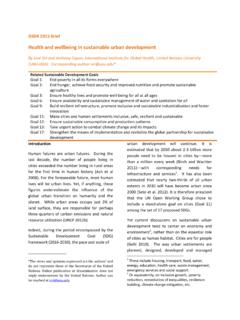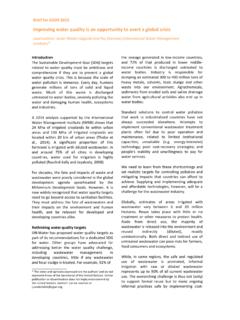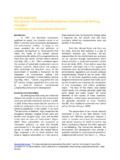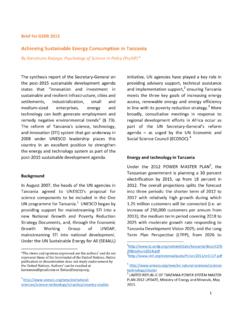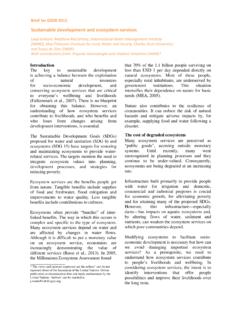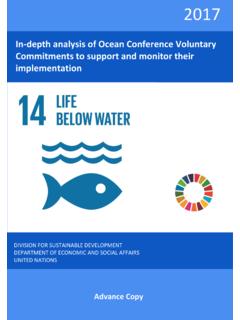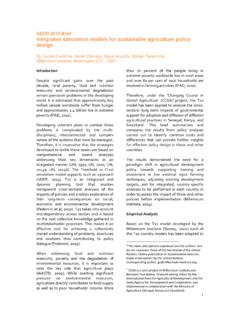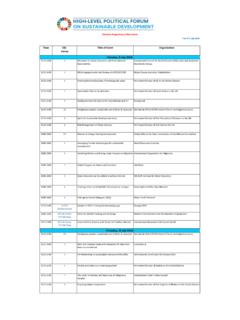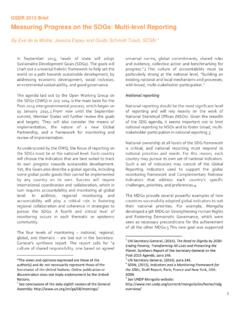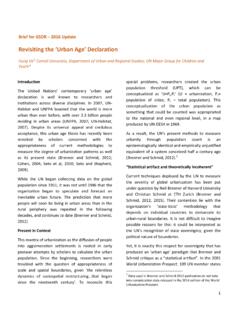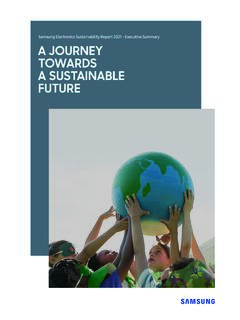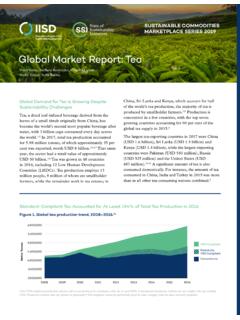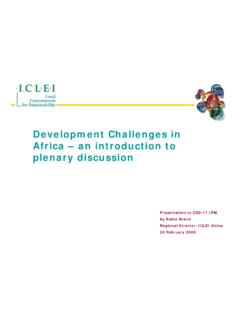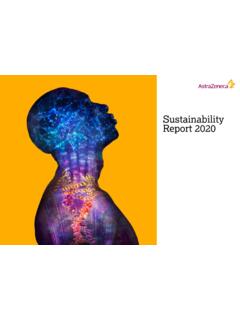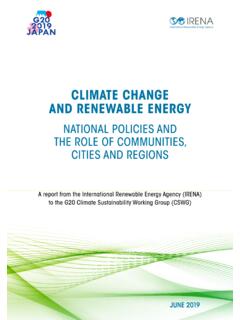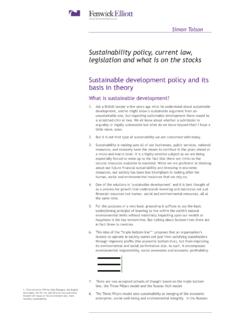Transcription of Challenges and opportunities for sustainable tourism …
1 Challenges and opportunities for sustainable tourism development The European Commission's actions to enhance sustainable tourism Ilona LELONEK HUSTING. UN Expert Group meeting on European Commission, sustainable tourism 29-30 October 2013, New York DG Enterprise & Industry tourism Policy Unit Date: in 12 pts Introduction tourism is a cross-cutting sector hence more than an economic activity It contributes to a wide range of key EU objectives: sustainable Development Economic Growth Job Creation Social and Regional Cohesion Protection of natural and cultural heritage EU citizenship Peaceful relationships etc.
2 Date: in 12 pts Facts & figures on EU tourism > the 3rd largest economic activity in the EU (after Distribution and Construction). >involving a big diversity of services and professions, > dominated by SMEs >relatively resilient sector despite uncertain economic outlook > socio-economic importance of tourism : 5% of the EU GDP. of the total labour force ( million jobs). but with other related sectors: 10% of the EU GDP. 12% of the total labour force (24 million jobs). Europe N 1 tourist destination in the world taking into account the number of international tourist arrivals INSERT. Thanks to great: cultural and historical heritage natural assets diversity of sceneries quality services good connectivity Among the top 10 countries visited: France, Spain, Italy, Germany and UK.
3 4. The EU competences in the field of tourism European Union 28 Member States Members States and their regions have full competence in implementing their respective tourism policies. EU competence (after the Lisbon Treaty art. 195) is to : Complement, support and coordinate the action of the Member States in the tourism sector How? By: Encouraging the creation of a favorable environment for the development of undertakings Promoting cooperation between the Member States, particularly by the exchange of good practice No harmonization of the laws and regulations of the Member States The main objectives of the EU tourism policy To facilitate the responsible competitiveness of the EU.
4 tourism sector, the sustainable growth and job creation of the tourism activity in the EU and globally in order to provide to the EU and third countries tourists high quality, best value for money, safe, innovative, sustainable and accessible tourism products/experience. Actions in line with the Europe 2020 strategy and its flagships initiatives: - Smart growth: Innovation Union - sustainable growth: Resource Efficient Europe - Inclusive growth: Agenda for New Skills and Jobs - European Platform against Poverty The EU tourism actions focused around following main axes: 1) Stimulating competitiveness in the European tourism sector (consolidating knowledge, ICT uptake, professional skills, improve EU tourism supply).
5 2) Promoting the development of a sustainable , responsible, and high quality tourism 3) Consolidating image and profile of Europe - improving/diversifying supply and enhancing quality of services. (Communication Campaign "Europe whenever you're ready"). 4) Maximising the potential of EU policies and financial instruments for developing tourism sustainability - a key aspect for the European tourism competitiveness. To be sustainable , tourism must be economically viable, meet the needs of society, conserve the environment and cultural heritage it depends upon, and in this way, continue to deliver benefits without detriment to current and future generations.
6 The European Commission: - incorporates sustainability in tourism related policies/actions - encourages Member States / tourism stakeholders to develop more sustainable tourism (by exchange of good practice, assisting, providing a supportive policy framework). Key Challenges for the sustainability of EU. tourism 1. Reducing the seasonality of demand 2. Addressing the impact of tourism transport 3. Improving the quality of tourism jobs 4. Maintaining and enhancing community prosperity and quality of life, in the face of change 5. Minimizing resource use and production of waste 6. Conserving & giving value to natural/cultural heritage 7.
7 Making holidays available to all 8. tourism as a tool in global sustainable development European Destinations of Excellence "EDEN". Objectives: Enhancing visibility of the emerging, non-traditional European tourist destinations of excellence Rewarding sustainable forms of tourism promoting networking between awarded destinations to persuade other destinations to adopt sustainable tourism development modes This European quest for excellence in tourism is developed around an annual theme (leitmotif), chosen by the Commission together with the relevant national tourism bodies. 2007 rural tourism 2008 local intangible heritage 2009 protected areas 2010 aquatic tourism 2011 tourism and regeneration of physical sites 2013 accessible tourism European Destinations of Excellence EDEN.
8 > 100 destinations awarded in Europe so far + 19 new destinations as from 11th November 2013. > EDEN Network - a platform for the exchange of good practices at European level between awarded destinations but also with the aim to persuade other destinations to adopt sustainable tourism development practice. European Destinations of Excellence "EDEN". The key feature of the selected destinations is their commitment to social, cultural and environmental sustainability . The recipients of the award are emerging, little known European destinations The process thus aims to help de-congest over-visited tourist destinations.
9 The initiative helps to spread the sustainable practices across the Union and to turn these little known but excellent places into all-year-round venues. Main benefits for destinations and their local economies: visibility, tourism flows, networking Date: in 12 pts " sustainable transnational thematic tourism products". EU supports development and promotion of sustainable transnational thematic products ( transnational cycle or hiking routes like: "EuroVelo" Network of long distance cycle routes, Greenways, itineraries based on nature, rural, gastronomic, pilgrims tourism , as well as: cultural or industrial heritage tourism routes passing by several European countries (European Cultural Routes, ).)
10 Other EU actions aiming at enhancing sustainable tourism development: European Charter for a sustainable and responsible tourism set of principles and guidelines for their implementation to encourage sustainable , responsible practices European tourism Indicator System (ETIS) for sustainable Management of Tourist Destinations Launched in February 2013, together with a practical step by step Toolkit (guidelines). tourism / European tourism Indicator System (ETIS). for sustainable destinations ETIS comprises 27 core and 40 optional indicators grouped into the sections: Destinations management, Economic value, Social and Cultural Impact, Environmental Impact Designed as locally owned and led process for monitoring, managing and enhancing the sustainability Tracking destination's performance and influence adequate policies enable on-going development and continous improvement.
